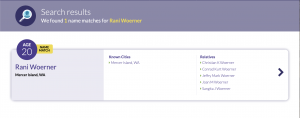Rani Woerner
The first time I Googled myself, I was shocked to find that I am the only Rani Woerner on the internet, and that fact came with a sense of pride for me when I was younger. I felt special being the only one of my friends who could find themselves on Google with a search as simple as a first and last name. But, as I reflect on the uniqueness of my name now, I’m starting to realize the consequences of being easily discoverable on the internet.
Having such a distinctive name allows anybody with a device and an internet connection to find a plethora of information about me on the internet by typing only my name into a search bar. My online identity is open to the public eye, and in a world where many people (potential employers, possible romantic partners…) often research others online before meeting them, this lack of online privacy is cause for concern.
My unease stems from the fact that my online identity fails to represent the person I am today due to the shallow and dated information about me on the internet, and while the disconnect between my personal and online identity may appear trivial, people like me who have an easily accessible but inaccurate online identity might miss out on important things like jobs or relationships based on the premature assumptions people could make from a quick online search.
Contents
Google Search
Upon Googling my name, I was swarmed with pages of results that, on the surface, encapsulated my high school experience. The majority of what I found on Google were race results from high school cross country/track and 5ks that I ran with my family. These search results paint running as one of the main components of my identity, and while that was true in high school, running no longer holds the same significance in my life that it once did. I still run recreationally, but these race results are all representative of my time competing, something I haven’t done in two years and don’t plan on doing again anytime soon.
I also found articles from my high school’s newspaper that I was quoted or mentioned in, minutes from meetings I attended for my high school’s Superintendent Advisory Council, and announcements of the awards/scholarships I won in high school. While these findings, like the race results, are from high school and are dated, they also paint a very superficial picture of who I was back then. These search results portrayed successful moments and things that I could tack on a resume, but they lack depth, leaving out the hard work it took to get to those moments and the bonds I created along the way.
As I dug through Google, another thing I found were bios for jobs and volunteer positions. Unlike most of the other results I saw, some of these positions happened to be more current than high school. However, these websites didn’t appear until the second or third page of the search results, and seeing as people don’t often navigate beyond the first page of Google, it’s likely that these websites will go unseen, and my Google presence will be reduced down to a surface-level view into the person I was in high school.
Data Broker
Data brokers didn’t prove to be much better, yielding some information that was outdated and other information that was entirely incorrect or unrelated to my identity.
The first data broker I tried, Instant Checkmate, had absolutely no information on me. My name had zero matches in that particular database. I then tried BeenVerified and found one Rani Woerner. After waiting multiple minutes for everything to load, I was met with a paywall, and so I had to purchase a $1 trial to access the information they had about me. This information included my home address in Seattle, possible usernames to my social media accounts, the meaning of my name, and names of my relatives, neighbors, and associates.
A lot of this information was outdated. The address from Seattle is my childhood home that I no longer live in. Yes, my family still lives there, but this address does not reflect my move to Ann Arbor nor the fact that I will not be living in that house for the foreseeable future. The list of neighbors is also dated, seeing as they are neighbors from a dated address. Additionally, the person listed as my associate nannied for my family, but she left us a couple years ago, and I haven’t been in contact with her since.
I also found information that was objectively incorrect. In my list of relatives that BeenVerified compiled, I found aunts, uncles, cousins, and two strangers with the same last name as my mom’s parents. While the last name is extremely common, making it easy for me to understand the mistake, these people I don’t even know are tied to my online identity, and I have no say in the matter. Therefore, people using data brokers such as these will either find zero information on me or a collection of tidbits that are representative of my childhood or just plain inaccurate.
Social Media
Some of the Google search results I saw were links to my social media profiles, so I decided to gather information on my social media presence, but I was again met with issues of datedness and shallowness.
I found very limited information about myself on Instagram and TikTok, seeing as I have made my Instagram private and rarely use TikTok. The information about me on those platforms is limited to a username, a follower count, a bio, and a profile picture.
Facebook, however, yielded a bounty of information ranging from a list of my Facebook friends to a library of photos, many of them embarrassing, that my friends tagged me in. I have been less active on social media since coming to college, but my sizable presence on Facebook suggests a commitment to social media that I no longer have and friendships with people I no longer speak to.
On LinkedIn, I could see anything I have uploaded or posted on my profile, and while I have kept the information on my LinkedIn current for recruiting purposes, this information is decently shallow. Essentially the same information I put on my resume, my LinkedIn is comprised of summaries and brief descriptions of my experiences and activities, reducing major parts of my personal identity, like the fact that I’m a student at the University of Michigan, down to a single line that contains the university name, my major, and my graduation year. Once again, researching myself online produced a surface-level, somewhat dated representation of me as a person.
My Online Identity
Did the internet get it right?
Utilizing the same search methods that others might use to look me up online, I got a good idea as to the accuracy, authenticity, and stability of my online identity. Except for a few mistaken relatives, my data identity was pretty accurate and authentic on the surface, but lacked depth, making it a less than ideal representation of myself. Although my personal identity is full of layers and complexities, these things go largely unrecognized in my online identity. I also found my online identity to be quite unstable over time. The vast majority of the information I found aligned with my personal identity at the time it was posted, but much of it is now dated. Looking at all of the information I found, I feel like my internet presence has not updated to reflect the person I have become since graduating high school and coming to college. For these reasons, I don’t think that my online identity is a good representation of my personal identity at the moment.
Conclusion
Being the only Rani Woerner on the internet, I have nowhere to hide; if someone researches my name online, their findings can be attributed to me with absolute certainty. My entire online presence is available for anyone to see with a simple search of my name, and it’s not even an accurate testament to who I am today because of how dated and shallow the information about me on the internet is.
Furthermore, a quick Google search and the discovery of my inaccurate online identity could easily lead to premature judgements and false notions about who I am as a person, which could prove detrimental when trying to form new connections with those researching me online, such as potential employers. Down the line, this could cost me jobs, relationships, and who knows what else, all based on a quick online search of my name.
While I used to think that finding myself on Google by typing only my name into the search bar was cool, this notion now concerns me. With our world becoming more and more dependent on technology, those with unique names, including myself, will be increasingly subject to online searches and the consequences that may follow. From someone who’s online identity is not reflective of their current personal identity, I hope people keep an open mind and take the time to personally get to know someone before making judgements based on what they see online.

